Noyce Scholars: Taking Student-Centered Math to High-Needs Schools
May 14, 2013
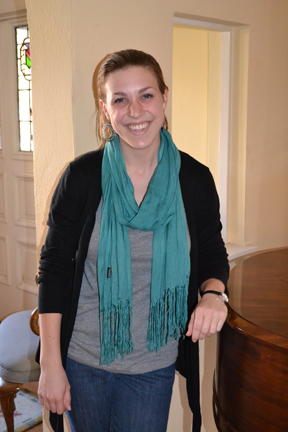
Noyce scholar Liz Denz.
Liz Denz
"Noyce is probably the best decision I've made professionally, and as far as my college career goes." Liz Denz
Liz Denz has wanted to teach math ever since her freshman year in high school. And Illinois' NSF-funded Noyce program, which provides scholarships for talented mathematics majors who want to become K-12 math teachers, is helping to make her and other Noyce scholars' dreams come true.
Who or what inspired Denz to want to teach math? The junior, a math major minoring in education, credits her freshman geometry high school teacher, Mr. Samide, whose His motto was: 'Think!'
"I hated him the first two weeks of school! He used the struggle principle: 'I'm gonna' give you this problem, and you have to think about it. I'm not gonna' give you the answer.' Denz recalls that if you came up and said, "I don't understand this!" his response would always be, "Think!" But because he continueally pushed her to get in front of the class and share her solutions, by the end of that first year, she had an epiphany: "Wow! I know what I'm saying. I know what I'm talking about. And I can make it so other people know what I'm talking about."
While she appreciates the scholarship, Denz says the money is a small part of Noyce's impact. For example, she especially appreciates the mentoring unique to Noyce scholars. Like all students in Math's teaching program, she is receiving practical teaching experience in a local classroom, supervised by a local teacher, so she can get a taste of what it's like to teach real students. However, because of the hectic pace, she rarely gets to discuss classroom situations with her supervising teacher.
Says Denz: "When you have that mentoring session...you get to talk about it. 'Well, this happened with a student, and I didn't know what I was going to do.' Or 'This happened, and I felt really great about it, but I don't know if this is ok.'…It's just really helpful to have that person to talk things out with that really knows what it is that you're talking about."
Having been placed in a local middle school, Denz is intrigued by the idea of teaching middle school math. She looks forward to exposing students to a variety of math disciplines; plus, she hopes to turn kids on to math.
"It's definitely a really formative time in students' lives," says Denz, who looks forward to "Creating that love of mathematics from a young age." She wants to change her students' aversion to mathematics ("Man, I'm in math class") to one of anticipation ("Yes, I get to go!"). Says Denz, "It's been kind of ingrained in our culture to dread mathematics. It's much harder to change by the time they get to high school."
One requirement of Noyce is that to receive the scholarship, scholars must agree to teach math in a high-needs school, which fits right in with Denz' plans. Ever since she tutored a second grade student who started out at kindergarten level in math but had progressed to grade level before she was done, she's understood how rewarding it can be to teach at-risk students:
"Sometimes teachers lose sight of the fact that they're just kids, and they want to be pushed, and they do want to learn, and they want to feel smart. It's our job to make them feel that way."
Esther Song
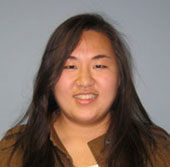
Noyce scholar Esther Song.
Esther Song, a member of the 1st cohort, "figured out her stance" during her year in Noyce. With a bachelor's degree in mechanical engineering, Song entered the program as a graduate student. Now in her second year of teaching, she teaches Algebra II at Niles West High School in Skokie, Illinois.
Song recognizes the importance of a teacher's educational belief system: "I have a stance on things, and I have a philosophy on education, and I have a belief on the way in which our kids should be grown up. And I think, without that, you kind of come out of a teacher education program saying, 'I'll do whatever you want.'"
Song has also been putting "creative insubordination" into practice. Before approaching her director about attending a "White Privilege Conference," she brainstormed, "How am I going to present it in a way that is going to make him feel like this is worthwhile?" So she presented it in such a way that it was mutually beneficial: "Often our lower-level classes are students of color. We've also got to think, 'What does it mean for these students of color to now be part of and integrated into regular classes?'" Her request was approved.
Song found Noyce to be an extremely high-quality teacher education program: "Just the level and the caliber of the type of training that we received is undeniably some of the best kinds of training that you could do for pre-teacher training."
She is also proud of the accolades Noyce has garnered: "As alumni are going out and starting to teach, there have been valid results with the kind of education that Rochelle provides that is not provided in the normal curriculum. One of the alumni of NOYCE has won the outstanding teacher of the year award in that school. Then we have another alumni who won the most outstanding first year teacher. We've got some of the undergrads who won major prizes or major awards from their majors, so I just have seen a lot of people recognized for what's going on."
Out of the program for two years now, Song still keeps in contact with people in Noyce. In fact, members of the 2nd cohort, now in their first year of teaching, ask for advice. "Sometimes people ask me, 'Ok, I've done this. Do you have any advice for me here?' I kind of wish that I had had that too when I was a first-year teacher, that I could have gone up to someone and said, 'So, you've done it for a year…'"
Nick Koberstein
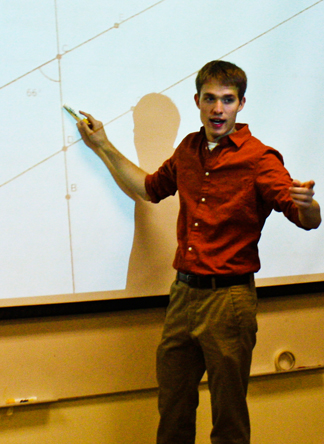
Noyce scholar alumnus Nick Koberstein explains a mathematical problem in his classroom.
Another Noyce alumnus, Nick Koberstein, who entered the program as a junior, is in his first year of teaching geometry at Knightdale High School in North Carolina. Koberstein reports, "Noyce definitely gave me direction. The teaching field can be very broad. You narrow it down to your subject area, but there are so many schools out there. Noyce helped direct me to a high-needs school which I feel has helped me get the most out of teaching. I feel like I am actually making a difference."
Of all that he learned through Noyce, what has been the most helpful? Keeping an open mind about students' abilities: "I think the thing that has helped me the most is remembering not to judge a student before I get to know them myself. I am constantly hearing stories from other teachers about students or see their past grades. It can be very easy to assume things about students when they first walk into the classroom. I try to show my students that I have high expectations for each one of them."
Emmanuel Del Rio
A junior in math, Emmanuel Del Rio wants to teach "anything but probability" in high school. He has wanted to be a math teacher ever since high school:
"When I graduated from high school, my whole idea was, 'I want to be a math teacher, because I want to be a role model." I wanted to exert this positive influence on others because that is what was done to me, and so I felt like it impacted my life a lot. But then I didn't really know how to incorporate teaching math into all of that. So it was like math would be the median."
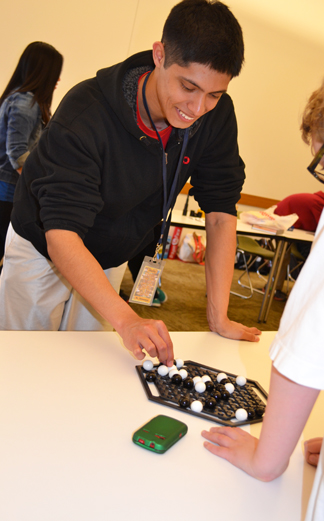
Del Rio plays a math game with a student during iMATHS club.
However, Del Rio reports a change of perspective regarding what teaching math is like since joining Noyce: "There is more to teaching math...You have to be involved with the community, with fellow teachers. You have to know how each student's mind works, because each student is different. That is what Noyce preaches: there is more to learning math than just what goes on in your teaching. There are so many other factors that influence and that can hinder learning. So that is what I like a lot; I was exposed to so many more outside circumstances."
Most Noyce scholars, including Del Rio, devote some Thursday afternoons to the i-MATHS club at the Champaign Public Library. So why would college students give up two valuable hours of their time that could be spent studying to go play math games with middle-schoolers?
Del Rio truthfully acknowledges, "I don't think that I am giving it up. I think that it is a really good investment, because if I wasn't going, I would probably be at home procrastinating doing something else…It's not wasted time; I think that it is a really good investment. There is really good discussion that goes on."
Del Rio also finds the club to be an opportunity to show students a different side of math.
"I also think it is like an extension to the classroom, because the type of math that is going on in here is completely different than what a traditional math teacher would convey in the classroom. This gives us a huge opportunity to learn how to engage students more and show them that math isn't just black and white. So many people say that math is black and white, but there is just so much more that lies underneath, and we get a really good chance to exploit that and show people that."
What are Del Rio's goals as a math teacher? "When I graduated, my mindset was on being this positive role model, and I still want to do that. But I feel like now I am getting a bigger sense of how to use math as a tool to give my future students a chance to question their world. Just don't take things for granted. Be open and flexible. Be able to critically analyze any type of information that you are given. And I think that math can be used as a tool to be able to do that."
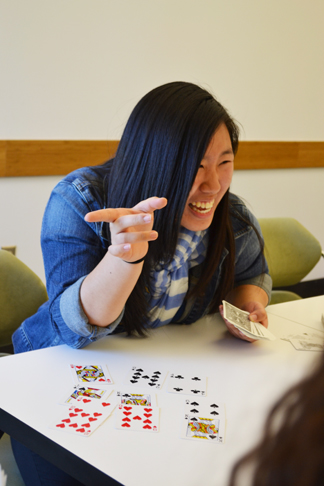
Eileen Ryu enjoying an interaction with a middle school student while playing a math-based card trick at iMATHS.
Eileen Ryu
Eileen Ryu, also a junior in math, reports that "Noyce just really changes your whole perspective of the classroom....It is not really the teacher up front, but it's more like looking at the students and their perspective and making them the center of the classroom—not the teacher."
Ryu, who had pretty much decided she wanted to teach high school math (trigonometry and geometry are her strong suit), reports that since observing in middle schools, she has started to lean more towards teaching that age-group. "I feel like I have a better connection with students who are a little younger, but yet mature enough that you can still talk to them."
Regarding the i-MATHS club, Ryu finds that it has a different dynamic than the classroom. One student who attends i-MATHS is actually in a middle school classroom she observes. "It is a little bit different between here and when we are in the observation, because I've got to be playing that teacher role, right? But here it is an after-school program, and it is a lot more laid back and less formal…I feel like I can connect more with the students, even though I am a college student; it's that friendly atmosphere, but it is not too friendly where it is like we are best buds."
Ryu's goal as a math teacher? "I feel like a lot of students or adolescents these days view math negatively, the sort of black and white idea where if you get it wrong, then it is all wrong…My goal, hopefully, as a math teacher is to change that conception, not so every student can love math, but to be more confident in math, to use it as a tool that they are more confident in using it and applying it, not so anxious about how to use it. So I guess my goal is to help students get a better view and perspective of what math is."
Story and photos by Elizabeth Innes, Communications Specialist, I-STEM Education Initiative
More: Champaign-Urbana Community, Funded, K-12 Outreach, Math, Teacher Professional Development, Underserved Minorities, 2013
For more information about the Noyce program, see this additional I-STEM webarticle: Noyce: Training Math Teachers Who Foster Equity in the K-12 Classroom.
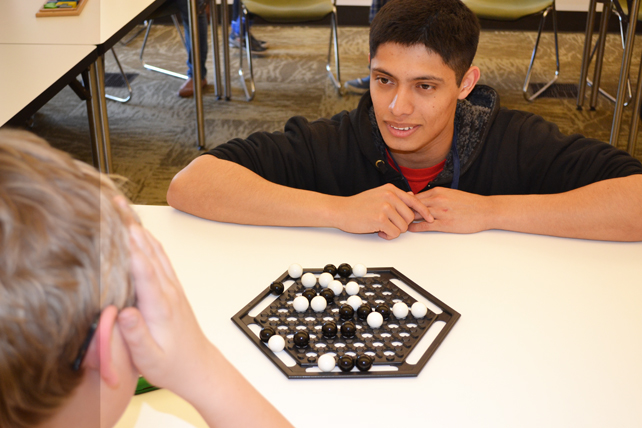
Emmanuel Del Rio, a junior in math at Illinois, plays Abalone with a local student.













.jpg)
















